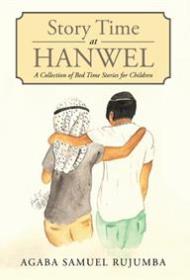Today, AuthorHouse is proud to introduce Agaba Samuel Rujumba to our readers. Foreword Reviews called his first self-published book, Story Time at Hanwel, “a one-of-a-kind compilation of moral tales for children of all ages and descriptions” (read the full review here). We’re pleased that he could take the time to talk with us.
Samuel, please tell us about yourself.
My name is Agaba Samuel Rujumba, and I work as a technician with ArjoHuntleigh UK. I hold a bachelors degree in tourism and wildlife management.
Were there any authors who influenced your writing style?
Yes, there were authors that inspired me–authors like Chimamanda Ngozi Adichie.
Tell us about your book Story Time at Hanwel.
Story Time at Hanwel is a culturally diverse and uniquely global compilation of twenty-one moral tales. With biblical scripture as a foundation, vastly different stories share the notion that prayer has healing and transformative powers.
Using a variety of forms from allegory to fable, and including both cautionary tales and rags-to-riches stories, Story Time at Hanwel embraces African history and tradition in communities all over the world, and throughout various periods in recent history. A wealthy Sudanese merchant caravans across the Sahara; a young boy in England is addicted to his smartphone and dreams of all the latest gadgets. Poignant scenes, often depicting cruel or harsh realities, are softly illustrated in pastel colors by Tukahirwa Noah.
With Bible verses preceding each chapter and enmeshed in each story, Christian principles and doctrine are an integral piece of every tale. Chapters often end with advice, admonitions, questions, or exercises to further engage readers in Bible-study fashion, such as “Now children, ask your parents to read for you the verses below and write what you see as the character of Jesus Christ.” Simple concepts of being “good” and “kind” are side by side with more complex ideologies such as the second coming of Christ, as in the stories “Joel: A Patient Boy” and “Jesus Christ, Our Advocate.”
Using a casual and at times didactic tone, each chapter tells a complete story in three to five pages. The stories typically involve a form of persecution or a tragedy to overcome, as when Facebook friends James from Tanzania and Tekele from Ethiopia survive a gang beating and go on to become missionaries in “Doing God’s Will.” The narration flows easily for reading quietly or aloud, and features boys, girls, men, and women of different ages and socioeconomic levels acting as heroes, villains, or both.
————————–
Readers, we’ll present the conclusion of our interview with Agaba Samuel Rujumba next week. His acclaimed book, Story Time at Hanwel, is available in the AuthorHouse Bookstore.
Follow AuthorHouse on Facebook and Twitter. For more information about how you can become a published author, click here for our FREE Publishing Guide.




One Response
I really enjoyed learning about Agaba Samuel Rujumba and his unique approach to storytelling. The blend of moral lessons with cultural diversity and biblical teachings is truly inspiring. Can’t wait for part two!